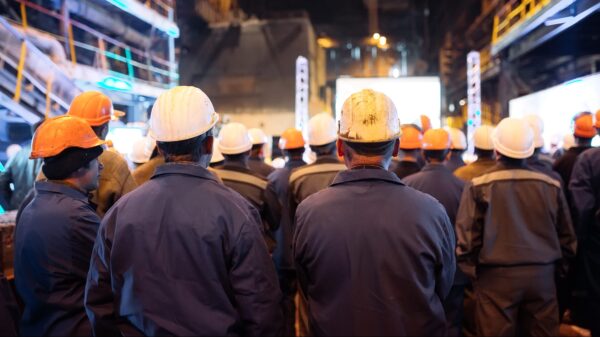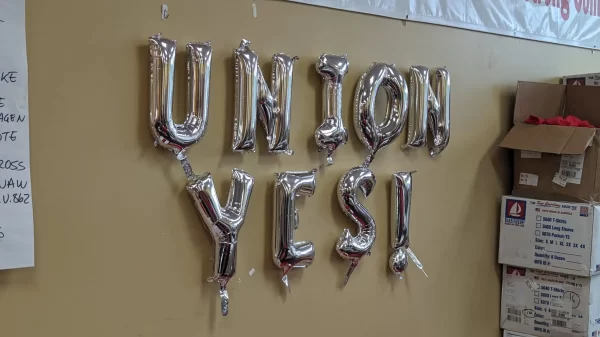Thousands of auto workers in Alabama are standing up — and the business class is scared.
At the end of October, the United Auto Workers (UAW) — newly led by a group of reformers who swept officer elections less than a year ago — concluded their Stand Up Strike, securing record contracts for 150,000 auto workers nationwide and reasserting the workers as an actor and shaper of their own futures.
The contracts included a 33 percent raise over 4.5 years when their Cost-of-Living Adjustment (COLA) is estimated. That in and of itself, winning back COLA, was said to be impossible less than a year ago. They also secured increased compensation for retirees, an end to tiers, and permanent employment for thousands of formerly temporary workers. For many, this contract will represent a life-changing 160 percent raise by the time the contract expires in 2028. But perhaps most importantly, and most historically, they forced Stellantis to reopen the Belvidere Assembly Plant and to commit to further investments and a new plant in the same area. This — reopening an indefinitely idled plant, and at the demand of the workers no less — has never been done before.
With the ink on the contracts barely being dry, the new UAW immediately turned to another historic battle — the organization of the unorganized American auto worker. Within days, thousands of workers began heeding the call, including here in Alabama. On January 10th, workers at Mercedes in Tuscaloosa announced that they had hit 30 percent cards signed. Workers now say they are nearing 50 percent. On February 1st, workers at Hyundai in Montgomery announced that they too had hit the 30 percent threshold. Nationwide, 10,000 nonunion auto workers have signed union cards. Workers in both shops cite deteriorating conditions, inconsistent management policies, and the contracts at the Big 3 as reasons for their interest in unionization. The testimony of these workers is backed up by the data: a new report on Alabama’s automotive industry shows that not only are workers here paid much less than similar workers nationwide — something widely known and indeed bragged about by our so called leaders in the state capitol — they make 11 percent less than Alabama auto workers did 20 years ago.
This figure still doesn’t begin to do justice to the conditions awaiting new employees in the Alabama auto industry though — as all the major auto companies have implemented a tiered compensation system. This means that new workers can expect to come in making up to 50 percent less than their counterpart in the same facility doing the same work.
In addition to the pay, the report found staggering issues with safety. For instance, in 2015, an Alabama auto worker was twice as likely to suffer from an amputation than an auto worker nationally. Speaking of amputation, a Hyundai-owned subsidiary in Montgomery has been fined more than $48,000 by OSHA since 2013, most recently in 2022 for amputation and crush hazards. Another parts manufacturer in the Hyundai supply chain had to dole out over $1,000,000 for the death of a 20 year old workers in 2016 after pleading guilty to a willful violation of an OSHA standard. At the same time, it was later revealed, Hyundai and its subsidiaries were employing dozens of children illegally and using prison labor.
Despite all the deteriorating conditions for auto workers in Alabama, up to and very much including threats to their lives, the supposed elected leaders of these auto workers are attacking them for daring to stand up and demand a say over the conditions in which they spend a majority of their waking lives.
Among other smears, politicians claim the UAW is an out of state interest group. In reality, workers at Mercedes had an organizing committee before the UAW even reached out to them, and only began organizing with the UAW after the UAW met their demands. They say that is a major reason this drive is getting so much success – it is worker-led. Had the UAW balked, the workers say they would’ve organized an independent union. And if Kay Ivey thinks that when Alabamians organize in cooperation with other American workers, we become an “out of state” special interest, wait until she hears about the countries of residence of Hyundai, Toyota, and Mercedes. One thing’s for sure, they’re a hell of a lot farther away than Michigan.
Not far behind, and in close coordination with the state government, the business class has begun their own offensive, penning an op-ed and building a website with the same tired talking points every half bit union busting consultant trots out.
They say that higher wages can lead to a strained relationship. Workers say that higher profits and falling wages do more to strain the relationship. They fear monger about dues, but for my dollar and for every other union member I know, our union dues are the best investment we’ve ever made. Many union members get 100% employer provided health insurance. For that alone, you could do a lot worse for a few dollars a month.
They try to scare workers by claiming a union contract would make it difficult for them to reward high productivity workers, but all a contract would do is standardize the system for compensation and rewards so that these things are less subject to favoritism and management manipulation (which is really why they hate it). Further – any union contract that would be implemented would be negotiated by and ratified by the very workers meant to be scared by this. For myself and my coworkers – if we didn’t want a provision in a contract, we would firstly not negotiate for it, and secondly we would vote it down if it were in the final product. Alabama’s auto workers today have no such democratic authority over the conditions of their work.
The most potent talking point they have is the specter of Detroit. They attempt to blame the unions for what happened to the American auto industry, specifically that the unions demanded wages too high to be competitive, thus the bankruptcy. This narrative is difficult to square with the reality, where the UAW has accepted concessionary contracts in every contract cycle since the 1970s, continuing to accept stagnating wages, deteriorating pension plans, tiers, and more until 2008 where they gave the biggest concession yet to save the companies. Workers accepted billions in cuts that they are only now beginning to recover, and management today makes more than they did before 2008.
Indeed, the UAW itself showed in this very contract cycle that the low road of showering businesses with public funds, low wages, and unsafe working conditions is not the only way to drive investment. Rather, the workers themselves can grab the wheel when needed, as they did when they forced Stellantis to commit to re-opening the idled Belvidere plant and to pay the laid off workers 75 percent of their wages in the meantime.
The reality is clear: the American auto industry was killed by globalization ushered in by Democrats and Republicans, by poor management decisions and the financialization of the American economy to include the auto industry, and corporate greed.
With the facts on their side, the exploitation of the companies to fuel their anger, and the support of a new UAW that has cleaned house, Alabama auto workers should feel confident in their decision to stand up, and the rest of Alabama’s working class should support them.
Ironically, the business class is right about the central theme of the struggle: power and control. Will the foreign automotive special interest groups continue to hold unquestionable and all powerful authority over the Alabamians that work for them, subjecting them to ever worsening conditions without their input, consultation, or consent, all the while suckling at the teet of the state government to tune of billions of dollars from the rest of us? Or will working Alabamians stand up and demand a seat at the table, a voice on the job, and more of the record profits that they create?
Those are questions that only the auto workers in Alabama themselves can answer. The question for the rest of us is this: which side are you on?























































